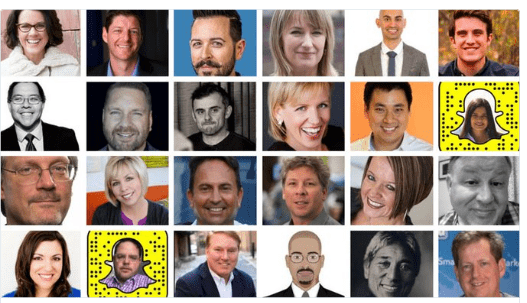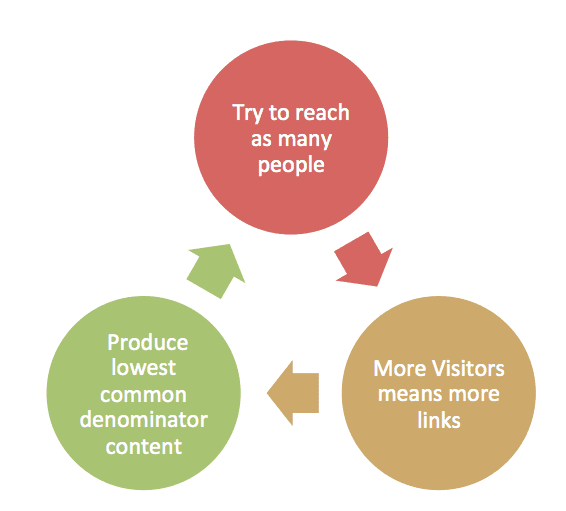A look at marketing through the lens of economics
I wouldn't call Mark Ritson a hero of mine, that'd be far too lame and I'm sure he'd laugh at me if he found out. But I think he makes some rather important points and I tend to sit up and listen whenever he has something to say.
Recently he has been bemoaning the 'tactification of marketing', which I think is an important enough issue to warrant making up the word 'tactification'. Marketers are increasingly distracted by the latest 'shiny object', and go chasing after it. This leaves them with less time, inclination and ability to sit down and think long and hard about the things which really make marketing campaigns successful; proper research, segmentation, positioning and strategy. The result is to dumb down the discipline and open the door to a whole host of people who are great communicators to call themselves marketers, but wouldn't know their brand equity from their market orientation. This has recently led Ritson to bemoan not just the tactification of marketing, but also the fact most alleged 'marketing experts' have no formal marketing qualifications. His fairly reasonable point was that you wouldn't expect expert economists or historians not to have degrees in the subjects of their purported expertise, it's strange we don't apply the same standards to 'expert marketers' who usually don't have formal marketing qualifications.

This point has stirred up plenty of controversy online, with a healthy and lively debate about whether marketing qualifications are really worth all that much. Whilst this debate is interesting, and I personally tend to think if you're good enough at marketing it doesn't really matter what qualification you've got, I sympathise with Ritson's position that the trend towards referring to people like Rand Fishkin (an SEO boffin) and Gary Vannerchuck (A gobby guy with a camera) as the best marketers around points to a tactification of marketing which is lamentable.
But the night is always darkest before the dawn, and as someone with a Masters degree in Economics (yep that's right, not marketing, shock horror), I wanted to start a bit of a cross-disciple love fest and show how economics can both explain the funk marketing currently find's itself in and shows how it will soon reach an inflection point and begin to change.
Why tactification?
It's one thing to criticise the tactification of marketing, or wistfully pine for the supposedly better days when marketers knew the 4Cs and the 6Ps and how to properly define their target market. But I think it's important to understand why it came about. Ritson explains it by basically saying marketers are being idiots being distracted by new tech, and would get better results if they listened to him and did marketing properly. I'm not so sure. I'm going to develop an alternative explanation.
Economics is concerned with building models of human behaviour relating to production and consumption. These ideas can be applied to the production and consumption of content. Once we understand why the tactification came about, we can build models to understand how the process will develop and predict it's future development.
Economics simplified the infinitely complex nature of human behaviour by thinking about people as 'homo economicus'. This essentially means we think of people as utility maximising rationalists. What does utility maximising mean? It means they will always take the route which requires the least effort to get the greatest possible gains. Whilst you can find plenty of people who aren't rational or don't always take the easiest route, when looking at human behaviour at large scale in economic models this conception of humans is fairly accurate and is needed to provide the foundation for building models of human behaviour.
Let's apply this concept to marketing. In the 'good old days' marketers had to reach people via print, outdoor ads, TV or if they were lucky a bit of PR. If their target audience was people working in financial services, they had to sit down and work out how to reach people in financial services. This meant market research, segmentation, positioning and executing a strategy to appeal to those people. Once it had all been worked out, you could place your ads in the FT or Telegraph and sit back and tot up the results. This required a fair bit of work, but there simply wasn't any other way to target people working in financial services. You didn't know their addresses, so couldn't direct mail them, you could take out TV ads but they wouldn't be well targeted so they'd be expensive, and billboards would suffer from the same problem. In short, this way of doing marketing offered the greatest returns for the least input at the time. In this model it was irrelevant the number of people reading the ad, the only metric which mattered was the number who then went to buy the product. This is an obvious point, but you'll see why it becomes important to the theory later.
How Google turned the world upside down
Google turned this on its head by bringing about the age of 'earned media'. Where once your only options were print, outdoor, TV or direct mail (all expensive) now you could do marketing for free! Not just do it for free, but get millions of views for free.
For almost all businesses (except FMCG) the most effective way of marketing your product suddenly became SEO. If you are going to change banks, get a mortgage, buy a car, buy a phone, book a holiday, what do you do? You Google it. Ranking top of keywords like say 'Ibiza holidays' organically suddenly meant you had an incredibly valuable source of leads that you would have to pay thousands of pounds a week for if it was a paid ad.
So the model changes. The utility maximising agent suddenly sees that SEO is the way to the greatest ROI, and so goes about trying everything they can do to boost their SEO. The nature of SEO itself means this completely changes the rules of the game. I'm sure Ritson disagrees about how important SEO is, and for FMCG brands he is probably right. But for a whole range of businesses it's hard to state just how critical it is. For Smart Insights we get over 80% of our traffic and revenue from organic search, this is absolutely enormous. The next biggest driver (be it social, PPC or any other tactic) just pales into comparison. It doesn't even drive 10% of the revenue as organic search.
'Good SEO' means ranking at the top of pages for certain keywords. The key metrics which decide where your site ranks for these keywords are links pointing to your site and the number of people visiting your site and for how long. The best way to cheaply get lots of links to your site? Encourage lots of visitors, that way people will see your site and if they then go and write something they're more likely to link to it. So the best way to rank is to attract more visitors, both because visits are a ranking factor, and because they indirectly lead to links, the most crucial ranking factor.
This means the best way to get more visitors is to get more visitors. Make sense?
Signalling and information a-symmetry
Now let me introduce another key concept from economics. Until the 70s, economics didn't really have anything to say about information a-symmetry. That all changed with the publication of what became one of the most important economics papers this century; 'The Market for Lemons' by George Akerlof, who went on to win a Noble prize.

The paper makes a simple point about information a-symmetry by looking at the used car market. Good used cars or 'peaches' are valuable to car dealers, who are willing to buy them for £1000. Used cars with hidden faults or 'lemons' are far less valued to car dealers, who would only buy them for £500. If a dealer can tell a lemon from a peach, then no problem. But a dealer can't always do this. The owner of the car knows every little thing wrong with the car because they drive it, but the dealer can't know for sure if there are certain defects or not. Assuming half of the cars on the market are lemons, a dealer should pay £750 for a car to hedge his or her bets. Sounds like a solution right? Except thanks to information a-symmetry it's not. If dealers offered £750 they would only end up with lemons, because the sellers who know they have a peach wouldn't accept £750 for a car they know is worth £1000, whilst the sellers with a lemon would happily sell a car worth £500 for £750. The concept of information a-sysmmetry turned the study of economics on it's head, and led economists how the problem of economics a-symmetry is countered in the real world. The answer is 'signalling'.
Signalling involves using certain things to prove worth so as to counter information a-symmetry. A worker knows if they're lazy or hardworking and self-motivated. But they can tell a prospective employer they're hardworking regardless of whether they really are or not. For an employer to choose between a line up of people all claiming they are hardworking and self-motivated, she turns to signals which might provide clues as to the real state of affairs. A good degree from a top university in history might show that a person is hardworking and self-motivated, because how else would they have got the degree? Knowing about history isn't remotely useful for the job, but it does signal a degree of worth to the employer because the employer knows getting the degree isn't easy. The qualification is thus a signal. It is not directly synonymous with the quality of the worker, but it is usually indicative of it.
Google works in the same way. Content creators know if their content is good or not, but because they are utility maximising agents they would always report their content to be the best, if Google let people rank content themselves. Therefore Google can't possibly use how good people say their content be a ranking factor, as it wouldn't help distinguish good from bad as all people would give their content the maximum possible score. Just like job applicants saying they are hardworking or car sellers claiming the gearbox works just fine. So like employers with job seekers, Google has to rely on signals. The signals Google use are links and visits, because they usually indicate good content. The content isn't necessarily good, it just has a better chance of being good if it displays those signals than content that doesn't. Just like how an employee with a good degree in history might still be a lazy sod, but generally if they managed to get the degree there probably less likely to be lazy than someone without one.
So what does this have to do with tactification? Well, in the old marketing, there was no point attracting people that were never going to buy your product. They might read your print ad or even enjoy your TV slot, but they didn't matter. In the new marketing attracting loads of people to your site who have nothing to do with your product still means you will rank higher for keywords which are searched by people who do see your product. Coming back to basic economic theory and applying the notion of utility maximising agents, the best way to attract more traffic (which will lead to higher positions in SERPs and thus more leads/sales) is to create content which appeals to the widest possible audience. Or as we also call it, the lowest common denominator. This creates a cycle where sites compete by creating content to appeal to the broadest possible audience. They do this because of the signals Google has to rely on to rank content.

I'm not saying all this 'lowest common denominator content' is always crap content. Far from it. Because SEO relies on visits (which are real humans, most of the time at least), writing crap content is always going to be a bad tactic. What I'm saying is the fact Google see's the value of every visitor as equal when using visits as a metric to assign a pages rank for a given keyword means marketers have to write content that appeals to lots of people, rather than just the exact few they actually want to buy stuff.
This rule applies within the discipline of marketing. If you're promoting your marketing consultancy or agency or whatever, you want to rank at the top of searches for 'marketing agency' etc. The best way to do this is to get lots of traffic. The best way to get lots of traffic is not to go and write amazingly detailed articles about marketing strategy which will be very useful and interesting to the CMOs of the top 500 companies in your country.
The best way is to write articles about tactics, like how to use Facebook, Twitter or the latest fad like Pokemon Go. These appeal to the millions of people with micro businesses or the thousands of people working as junior execs in marketing departments up and down the country.
I experience this first hand every day as SmartInsights' blog editor. A brilliant article on applying behavioural economics to marketing might get shared a handful of times and not really be worth the time (hours and hours) spent researching and writing it. Where as a cheap and cheerful article with a clickbaity headline about 'Hacks to boost your Facebook engagement' or some other such nonsense that took 30 minutes to bash out gets shared 500 times. Marketers love of analytics then means we treat the cheap and cheerful options as far more valuable than the thoughtful and well researched one, and then as rational utility maximisers we stop bothering to research long thought pieces and instead focus on getting results by writing blogs called '34 mind blowing stats about memes'. I realise by taking my time to write this long thought piece I've just technically proven myself wrong, but I think it's indicative of a personal masochistic streak rather than anything wider.
Why this will change
Another key concept of economics is Schumpeterian 'creative destruction', where old business models are superseded by newer ones. This destroys the companies and jobs of old businesses, but creates new jobs and new companies, slowly building a more efficient economy and causing growth. Creative destruction is the key to understanding how developed economies grow. People often wrongly think of creative destruction as a new process synonymous with the digital revolution. But it's happened many many times throughout history. In 1800s America the vast majority of Americans were employed in agriculture. The industrial revolution destroyed 95% of those jobs, but unemployment didn't increase; the employment shifted to new jobs in industry. Similarly in many Western economies industry has been mostly automated, destroying the manual jobs which used to employ a big chunk of the workforce. Despite the destruction of these jobs Employment in the UK and US is low, and near or at what economists call it's 'natural rate'. My dad grew up wanting to be a coal miner. I make my living writing about digital marketing. We reinvent the world every generation.
Innovation is a constant and will continue to change business models. If you told someone in rich and bustling 1950s Detroit the place would be a ghost town in 30 years, they'd have laughed you out of the room. It's like me saying in 30 years the rich hipsters of Silicon Valley will all be queuing for food stamps. We've established in this article a major flaw in how Google works to assign an article's relevance to users. It currently works using links and visitors as signals to establish the worth of an article (other things like keywords are also important). This is a flawed way of doing it, but the best available for now. I don't know how this will change in the future, if I did I'd be making the next Google right now. But I do know that change is a constant. Someone will find a way to make the quality of the information itself the key factor in searching for that information, rather than just factors which indirectly signal that the information is quality, like links and visits. Maybe it will use amazing powerful AI. Maybe it will have something to do with quantum computing. Maybe it'll be Google that will do it, maybe it will be a new start up. I don't know, but the change is coming. It's already beginning to happen with the increasing personalisation of content and factors like RankBrain being baked into the Google algorithm. It's only a matter of time before Google starts showing personalised results so the SERPs for a given keyword are different for every person based on what would be relevant to them.
Once it does, they'll be no need to create the lowest common dominator content to appeal to the largest possible audience. The rules of the game will change. The utility maximising rational agent will see there is no point writing articles about using Snapchat filters to get traffic and social shares, and will have to start doing proper research, defining their audiences and properly targeting them with content strategized to appeal just to them.
And when it does the people endlessly cranking out easy pieces on tactics are going to be in for a shock.










